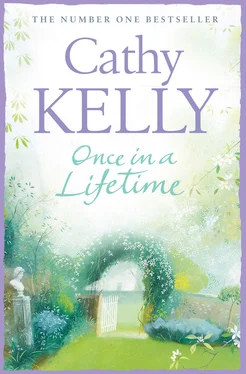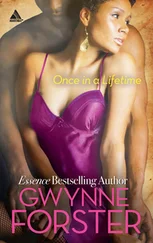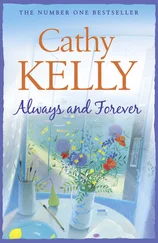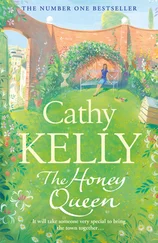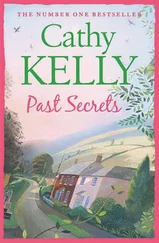Star fed the cats, then made herself breakfast of fruit and yogurt, and stewed a cup of mint tea which she drank in the tiny conservatory. Breakfast over, she dressed. Her toilette never took long: she would shower, brush hair that was still as blonde as it ever had been, albeit with many strands of white, and apply a little kohl on her dark eyes. It was an unusual combination: pale hair, olive skin and dark eyes. Her old friend Trish, whom she sometimes bumped into in the supermarket, had grown round, and always wanted to know how Star remained as slim as ever.
‘It’s nothing I’m doing,’ Star would say. ‘My mother was the same, you remember.’
Trish nodded, remembering. And Star could almost read Trish’s next thought, which was that three children made a person put on weight, and Star, after all, had no children, and no grandchildren, and what was the point of being slim and sixty if you hadn’t the pleasure of a family?
Star would have loved to have children: the feel of a small, trusting hand in hers, a little girl of her own to sit with in the walnut love-seat and teach to plant trees. But that hadn’t been her path. She’d been given the gift of creating works of beauty, and the gift of making plants grow. Once, it might not have been enough. Now it was.
Besides, the women she’d helped in her life were almost like children to her. Star’s talent for collecting lost souls had given her mothering instinct a powerful outlet.
She dressed with speed, her clothes the colours of the garden she loved: pastels in spring, warm rosy hues in summer, golds when the leaves were turning in autumn, and the cool shades of a snowy landscape in winter. Today, it being February, she dressed in a cream woollen dress with a grey fitted coat and black high boots. She swept her hair up off her face and fastened it in a low knot at the base of her neck. Her everyday uniform was very different, loose skirts or jeans and T-shirts, but today, she needed to appear the smart businesswoman.
Kenny’s department store was an institution. The word had become a cliché, but Kenny’s truly was one. Established in 1924, when Europe was recovering from the Great War and Ireland was emerging on to the world stage, after the ravages of the Civil War, Kenny’s became the local byword for style. It was the place where all were welcomed, the moneyed classes and those who hoped one day to belong to the moneyed classes. Old Mr Kenny’s dictum was that every customer was to be treated with courtesy, working man and titled lady alike. Its combination of elegance and egalitarianism contributed to its success.
Over the years, so much of Ardagh had changed: entire streets had been transformed as old family businesses made way for high street chains and big conglomerates. The Classic Cinema, where Star and her friends had eaten popcorn and screamed their way through Jaws, was now a car park, and the Soda Pop where they’d drunk cheap coffee and occasionally had enough money to indulge in the house speciality–a banana split–had been demolished and a supermarket built in its place.
But Kenny’s never changed. It had been updated, with plenty of money spent, but the place looked and felt essentially the same: a graceful old-style Edwardian shop front that took up an entire block, with glossy small-paned windows and swing doors ornamented with shining brass fittings. A curlicued sign hung over every door: Kenny’s–Established 1924.
Star left her car in the car park behind Kenny’s, walked around to the delivery door at the back and pressed the bell. It was over an hour to opening, and most of the staff wouldn’t have arrived yet, but Lena had promised to be at the delivery door at eight. The door buzzed and Star pushed it open, pulling the small wheelie trolley, with its precious cargo of tapestries, behind her. The place was dark and there was nobody visible, so Star wasn’t sure who’d buzzed her in, but she began to walk in the direction of the back stairs to the offices, looking around for signs of life. The doors to the stairs were locked when she tried them. The only bit of light was coming from the double doors that led on to the shop floor. Perhaps that’s where Lena was.
Star pushed open the doors and breathed in the magical scent of Kenny’s.
After the gloom of the delivery area, it was like entering a beautifully lit jewel box. In the distance, she could hear the faint drone of a vacuum cleaner. The lights were on in the shop and the scents of perfume mingled with the smell of furniture polish and a faint hint of warm pastries wafting down from the café upstairs. She left her trolley against a wall and began to walk through this paradise, enjoying the sensation of being there all on her own.
Lena often chatted about the various departments. How David Kenny, the current owner, had said he wanted a very distinctive jewellery area, with unusual pieces from local craftsmen and women as well as the big brands. It was the same in the fashion department: there was a small section where young, just-out-of-college designers could display their clothes. The perfume and cosmetics halls, the most valuable space per square metre in any department store, were filled with all the usual brands, but pride of place went to Organic Belle, a range of skin products made entirely in a small village in West Cork.
‘David has a great eye for the next big thing,’ Lena confided. ‘Nobody had heard of Organic Belle when he brought them in two years ago; now they’re big in Los Angeles and some famous hotel chain wants the range in all their spas. They’re going to be huge. You should try the products. We’ve a lovely woman who works there, Charlie Fallon. She could help you.’
Star sensed that Lena thought she was the epitome of an eccentric artist, partly because she lived in such a remote spot, and partly because Star had said she rarely visited Kenny’s. Lena, who lived and breathed the store, and didn’t see how anyone else could fail to adore the place, was shocked.
‘You mean, you don’t shop there?’
‘I was there twice last year,’ Star pointed out.
‘But that was to see me,’ Lena said.
Consequently, she did her best to sell the notion of Kenny’s to Star, highlighting bits she thought Star might like, which included anything vaguely natural.
Passing the Organic Belle counters, Star inhaled the subtle scent of the brand’s best-selling balm: an instantly relaxing combination of lemongrass and lavender.
Star had seen Charlie, the woman Lena had spoken of, on one of her earlier visits. Although she didn’t exactly resemble her mother, Star was pretty sure that Charlie was the younger daughter of Kitty Nelson, a stalwart of the women’s feminist movement in the seventies and someone Star had known many years ago. It was the eyes: ever so slightly cat-shaped. But while Kitty’s eyes had been feline in every respect, particularly when it came to men, Charlie’s were soft and gentle. She would be a very different sort of woman to her feisty, femme fatale mother, Star instinctively felt.
Beyond the Organic Belle counters, lay the entrance to the food hall, and even though all the boxes of sweets and cookies were packed away, the lingering aroma of caramel and butter filled the air.
‘I love the food hall,’ Lena had explained, determined to make Star into a Kenny’s fan. ‘We sell proper food there. David realised there was a vast market for ready-to-eat gourmet food and since we’ve started selling the locally produced “I Made It Myself, Honest” range, sales have been enormous.’ People loved the food, Lena went on: simple produce expertly cooked with zero additives.
On her previous visits, Star had been into the homes department, which sold Irish pottery and glass. Star could never resist pottery, but she hadn’t been into the lingerie department, despite Lena explaining about their biggest seller: a range made by a former home economics teacher from Dublin who was fed up with trying to get comfortable suck-it-all-in underwear for women over size 18, and had designed her own range.
Читать дальше
